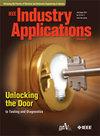Smith Predictor Based Fractional LFC Strategy for Storage Supported Thermal Power System Amid Communication Dead Time and Cyber Threats
IF 4.5
2区 工程技术
Q2 ENGINEERING, ELECTRICAL & ELECTRONIC
引用次数: 0
Abstract
Communication dead time (CDT) amid integration of renewable energy sources (RESs) and energy storage systems (ESSs) into modern power system networks can result in instabilities, phase lags and sluggish corrective action when dealing with frequency and tie-line power deviations. To compensate CDT, a Smith predictor based Fractional Order Proportional-Integral-Derivative with Integrator (FPIDI) controller is analytically designed for a dual-area thermal power system (TPS) with integrated RES, battery ESS, flywheel ESS and Ultra-capacitors. The FPIDI controller is designed using a modified internal model control (IMC) theory that is based on the frequency-relocated fractional-order model of the TPS. This modified IMC method eliminates the need of phase-lag inducing IMC filter. The performance-robustness tradeoff is enhanced by appropriate selection of the single tuning parameter (frequency-relocation factor (基于Smith预测器的存储型火电系统在通信死区和网络威胁下的分数LFC策略
可再生能源(RESs)和储能系统(ess)集成到现代电力系统网络中的通信死区(CDT)会导致不稳定、相位滞后以及在处理频率和联络线功率偏差时纠正行动迟缓。为了补偿CDT,针对集成了RES、电池ESS、飞轮ESS和超级电容器的双区热电系统(TPS),分析设计了基于Smith预测器的分数阶比例积分导数积分器(FPIDI)控制器。FPIDI控制器采用改进的内模控制(IMC)理论设计,该理论基于TPS的频率重定位分数阶模型。这种改进的IMC方法消除了对相位滞后诱导IMC滤波器的需要。通过最小化区域控制误差的时间加权绝对值的积分,适当选择单个调谐参数(频率重定位因子($\psi$)),增强了性能-鲁棒性权衡。通过仿真和硬件在环实现验证了所提控制器的实际可行性。
本文章由计算机程序翻译,如有差异,请以英文原文为准。
求助全文
约1分钟内获得全文
求助全文
来源期刊

IEEE Transactions on Industry Applications
工程技术-工程:电子与电气
CiteScore
9.90
自引率
9.10%
发文量
747
审稿时长
3.3 months
期刊介绍:
The scope of the IEEE Transactions on Industry Applications includes all scope items of the IEEE Industry Applications Society, that is, the advancement of the theory and practice of electrical and electronic engineering in the development, design, manufacture, and application of electrical systems, apparatus, devices, and controls to the processes and equipment of industry and commerce; the promotion of safe, reliable, and economic installations; industry leadership in energy conservation and environmental, health, and safety issues; the creation of voluntary engineering standards and recommended practices; and the professional development of its membership.
 求助内容:
求助内容: 应助结果提醒方式:
应助结果提醒方式:


